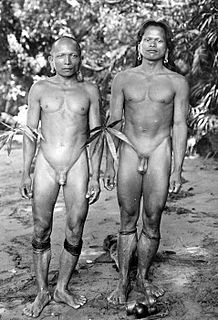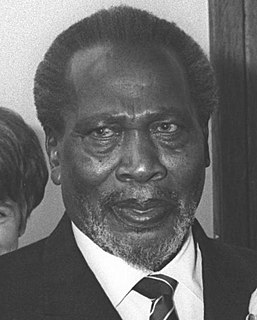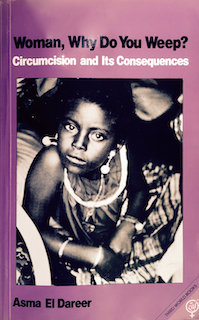Related Research Articles

Female genital mutilation (FGM), also known as female genital cutting, female genital mutilation/cutting (FGM/C) and female circumcision, is the practice of cutting or removing the external female genitalia without medical justification or consent. The practice is found in some countries of Africa, Asia and the Middle East, and within communities abroad from countries in which FGM is common. UNICEF estimated, in 2016, that 200 million women in 30 countries—Indonesia, Iraqi Kurdistan, Yemen, and 27 African countries—had been subjected to one or more types of FGM.

The terms genital modification and genital mutilation can refer to permanent or temporary changes to human sex organs. Some forms of genital alteration are performed on adults with their informed consent at their own behest, usually for aesthetic reasons or to enhance stimulation. However, other forms are performed on people who do not give informed consent, including infants or children. Any of these procedures may be considered modifications or mutilations in different cultural contexts and by different groups of people.
Infibulation is the ritual removal of the external female genitalia and the suturing of the vulva, a practice found mainly in northeastern Africa, particularly in Djibouti, Eritrea, Ethiopia, Somalia, and Sudan. The World Health Organization refers to the procedure as Type III female genital mutilation. Infibulation can also refer to placing a clasp through the foreskin in men.

There is a widespread view among practitioners of female genital mutilation (FGM) that it is a religious requirement, although prevalence rates often vary according to geography and ethnic group. There is an ongoing debate about the extent to which the practice's continuation is influenced by custom, social pressure, lack of health-care information, and the position of women in society. The procedures confer no benefits and can lead to serious health problems.

The Prohibition of Female Genital Mutilation (Scotland) Act 2005 is an Act of the Scottish Parliament. It extended previous legislation by also making it illegal for UK nationals to perform female genital mutilation outside the borders of the UK. There have been no known cases of girls from Scotland being sent abroad for the procedure. The Act also increased the maximum penalty from five to 14 years.
Research Action and Information Network for the Bodily Integrity of Women is an international non-governmental organisation working to eliminate female circumcision and female genital mutilation.
Nahid Toubia is a Sudanese surgeon and women's health rights activist, specializing in research into female genital mutilation.

Female genital mutilation (FGM), also known as female genital cutting (FGC), is practiced in 30 countries in western, eastern, and north-eastern Africa, in parts of the Middle East and Asia, and within some immigrant communities in Europe, North America and Australia. The WHO defines the practice as "all procedures that involve partial or total removal of the external female genitalia, or other injury to the female genital organs for non-medical reasons."

The campaign against female genital mutilation in colonial Kenya (1929–1932), also known as the female circumcision controversy, was a period within Kenyan historiography known for efforts by British missionaries, particularly from the Church of Scotland, to stop the practice of female genital mutilation in colonial Kenya. The campaign was met with resistance by the Kikiyu, the country's largest tribe. According to American historian Lynn M. Thomas, female genital mutilation became a focal point of the movement campaigning for independence from British rule, and a test of loyalty, either to the Christian churches or to the Kikuyu Central Association, the largest association of the Kikuyu people.
Ellen Gruenbaum is an American anthropologist. A specialist in researching medical practices that are based on a society’s culture.
Female genital mutilation in the United Kingdom is the ritual removal of some or all of the external female genitalia of women and girls living in the UK. According to Equality Now and City University London, an estimated 103,000 women and girls aged 15–49 were thought to be living with female genital mutilation (FGM) in England and Wales as of 2011.

Female genital mutilation (FGM), also known as female circumcision or female genital cutting, includes any procedure involving the removal or injury of part or all of external female genitalia for non-medical reasons. While the practice is most common in Africa, Asia, and the Middle East, FGM is also widespread in immigrant communities and metropolitan areas in the United States, and was performed by doctors regularly until the 1980s.
Female genital mutilation in Sierra Leone is the common practice of removing all or part of the female's genitalia for cultural and religious initiation purposes, or as a custom to prepare them for marriage. Sierra Leone is one of 28 countries in Africa where female genital mutilation (FGM) is known to be practiced.
Female genital mutilation (FGM), also known as Female Genital Cutting (FGC) in Nigeria accounts for the most female genital cutting/mutilation (FGM/C) cases worldwide. The practice is customarily a family tradition that the young female of the age 0-15 would experience. It is a procedure that involves partial or completely removing the external females genitalia or other injury to the female genital organs whenever for non-medical reasons.
Balghis Badri is a Sudanese feminist activist, particularly in the fields of female genital mutilation (FGM) and the development of rural women, since 1979, and professor of social anthropology at Ahfad University for Women.
Asma Abdel Rahim El Dareer is a Sudanese physician known for her research in the 1980s into female genital mutilation. She was one of the first Arab women and feminist doctors to speak out publicly against the practice.
Female genital mutilation (FGM) is highly prevalent in Sudan. According to a 2014 Multiple Indicator Cluster Survey (MICS), 86.6 percent of women aged 15–49 in Sudan reported living with FGM, and said that 31.5 percent of their daughters had been cut. The most common FGM procedure in that country is Type III (infibulation); the 2014 survey found that 77 percent of respondents had experienced Type III.
Lilian Margaret Passmore Sanderson was an English teacher and educationalist who became known for her research on female genital mutilation, particularly in Sudan. She was the author of Against the Mutilation of Women: The Struggle Against Unnecessary Suffering (1981) and Female Genital Mutilation, Excision and Infibulation: A Bibliography (1986).

Woman, Why Do You Weep? Circumcision and Its Consequences (1982) is a book by Sudanese physician Asma El Dareer about female genital mutilation in Sudan. Published in London by Zed Press in association with the Babiker Bedri Scientific Association for Women's Studies, the book summarizes research El Dareer conducted on female genital mutilation (FGM) for the medical faculty of the University of Khartoum.
Amina Mahmoud Warsame is a Somali social scientist who served as executive director of Nagaad, a women's group in Hargeisa Somaliland. Co-author of Social and Cultural Aspects of Female Circumcision and Infibulation: A Preliminary Report (1985), she was one of the early voices raised in Africa against female genital mutilation, along with Raqiya Abdalla, Asma El Dareer, Efua Dorkenoo, and Nahid Toubia.
References
- ↑ Badri, Amna Elsadik (1996). "Sudan: Women's Studies—and a New Village Stove". In Morgan, Robin (ed.). Sisterhood is Global: The International Women's Movement Anthology. New York: The Feminist Press at the City University of New York. p. 653.
- ↑ El Dareer, Asma (1982). Woman, Why Do You Weep? Circumcision and its Consequences. London: Zed Books. back cover. ISBN 978-0862320997.
- ↑ Badri 1996, p. 650.
- ↑ Ahmed, Shahira (2007). "The Babiker Badri Scientific Association for Women's Studies and the Eradication of Female Circumcision in the Sudan". In Abusharaf, Rogaia Mustafa (ed.). Female Circumcision: Multicultural Perspectives. Philadelphia: University of Pennsylvania Press. p. 171 (pp. 171–186). ISBN 978-0812201024.
- ↑ Ahmed 2007, p. 178.
- ↑ Ahmed 2007, pp. 178–179.
- ↑ Cappa, Claudia; et al. (July 2013). Female Genital Mutilation/Cutting: A Statistical Overview and Exploration of the Dynamics of Change (PDF). New York: United Nations Children's Fund. pp. 8–9.